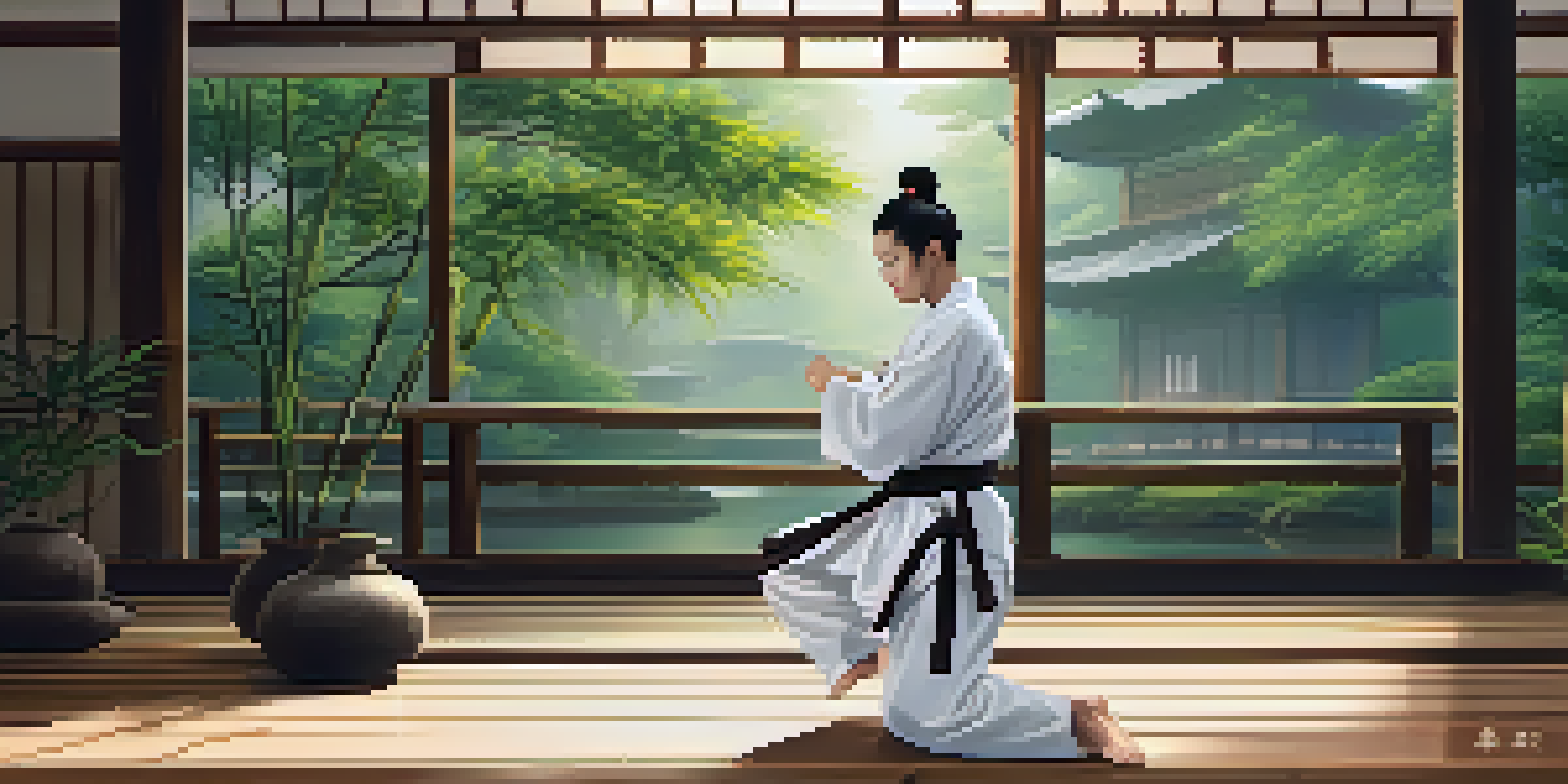Applying Martial Arts Discipline to Everyday Conflicts

Understanding the Core Principles of Martial Arts
Martial arts are more than just physical combat; they embody discipline, respect, and self-control. These core values can be applied to everyday situations, helping us navigate conflicts with a clear mind and a focused approach. Just as a martial artist prepares for a match, we can prepare ourselves for life's challenges by understanding these principles deeply.
The ultimate aim of martial arts is not having to use them.
For instance, consider the concept of 'dojo'—a training space where respect and learning flourish. In our daily lives, we can create a similar environment in our interactions, emphasizing mutual respect. This foundational mindset can transform how we handle disagreements, making us more receptive and less reactive.
By recognizing that conflicts are opportunities for growth, akin to sparring in martial arts, we can shift our perspective. This helps us approach disputes not as battles but as chances to learn, fostering a more peaceful and constructive atmosphere.
The Importance of Self-Control in Conflict Resolution
Self-control is a fundamental aspect of martial arts training. It helps practitioners remain calm and collected, even in high-pressure situations. Similarly, exercising self-control during conflicts can prevent escalation and lead to more productive discussions.

Imagine you're in a heated argument with a friend or colleague. If you can channel the self-discipline learned from martial arts, you may find that taking a deep breath and pausing before responding can change the entire dynamic of the conversation. This pause allows you to assess the situation rather than react impulsively.
Self-Control Enhances Discussions
Practicing self-control during conflicts can prevent escalation and foster more productive conversations.
Ultimately, self-control not only benefits you but also sets a positive tone for others involved. When you demonstrate poise, it encourages those around you to follow suit, paving the way for a more harmonious resolution.
Practicing Awareness: The Martial Artist's Mindset
Awareness is a key skill in martial arts, allowing practitioners to read their opponents and react strategically. This same level of awareness can be invaluable in everyday conflicts, helping you to understand the emotions and motivations of others. By being mindful, you can respond rather than react, leading to more thoughtful interactions.
In the midst of movement and chaos, keep stillness inside of you.
For example, during a disagreement, actively listening to the other person's perspective can uncover underlying issues that may not be immediately apparent. This approach fosters empathy and paves the way for mutual understanding, much like how a martial artist anticipates an opponent's moves.
Moreover, cultivating awareness in our daily lives encourages us to reflect on our own responses. By checking in with ourselves, we can identify triggers and patterns that may lead to conflict, allowing us to address issues before they escalate.
The Power of Respect in Dispute Resolution
Respect is a cornerstone of martial arts practice, fostering a culture of dignity and understanding. When conflicts arise, maintaining respect for others—even in disagreement—can significantly alter the outcome. It’s about recognizing the humanity of the other person, even when opinions clash.
For instance, during a disagreement at work, showing respect can involve acknowledging the other person's viewpoint, even if you disagree. This simple act can diffuse tension and create a more open dialogue, reminiscent of the respectful interactions seen in dojos.
Respect Transforms Disagreements
Maintaining respect for others during conflicts can significantly improve communication and lead to better resolutions.
Emphasizing respect not only enhances communication but also builds trust. By treating conflicts as conversations rather than confrontations, we can work toward resolutions that honor everyone's perspectives.
Embracing Adaptability: A Martial Artist's Skill
Adaptability is a vital skill learned in martial arts, allowing practitioners to adjust their techniques based on the situation. This flexibility is equally crucial in everyday conflicts, where rigid thinking can lead to escalation. Embracing adaptability means being open to different solutions and approaches.
Imagine a scenario where you and a friend have differing opinions on a vacation plan. Instead of insisting on your choice, being adaptable means considering alternative options that might satisfy both parties. This collaborative spirit mirrors how martial artists adapt to their opponents' moves.
By adopting a mindset of adaptability, we become better equipped to handle surprises and shifts in conversations. This openness can transform conflicts into opportunities for collaboration, leading to creative solutions that benefit everyone involved.
Finding Center: The Role of Mindfulness in Conflict
Mindfulness, a practice often associated with martial arts, involves being fully present in the moment. In the context of conflict resolution, mindfulness allows us to engage in discussions without being clouded by past grievances or future anxieties. This clarity fosters more constructive interactions.
For example, when faced with a disagreement, taking a moment to center yourself—perhaps through deep breathing or a brief pause—can help clear your mind. This practice can prevent emotional flooding and enable you to respond thoughtfully, rather than reactively.
Community Supports Conflict Resolution
Building a sense of community around conflict resolution encourages collaboration and strengthens relationships.
Furthermore, cultivating mindfulness can enhance your ability to empathize with others. When you're fully present, you're more likely to hear not just the words being spoken but the emotions behind them, leading to a deeper understanding and more effective conflict resolution.
Building Community Through Conflict Resolution
Martial arts often emphasize community and the support of fellow practitioners. When conflicts arise in our personal or professional lives, leveraging this sense of community can help create a more constructive environment. Engaging with others can provide new perspectives and solutions.
Consider a situation where a team at work is struggling with a project and tensions are high. By fostering an open dialogue and encouraging team members to share their thoughts, you create an environment reminiscent of a dojo, where everyone contributes to the learning process.

Building a sense of community around conflict resolution not only strengthens relationships but also empowers individuals to approach disagreements collaboratively. When we see ourselves as part of a team, it becomes easier to navigate conflicts with understanding and support.
Conclusion: Applying Martial Arts to Everyday Life
Integrating martial arts principles into our daily lives can transform how we handle conflicts. By emphasizing self-control, awareness, respect, adaptability, mindfulness, and community, we create pathways for resolution that are peaceful and constructive. These principles not only benefit us individually but also enrich our relationships.
As we practice these skills, we develop a greater understanding of ourselves and others, leading to more harmonious interactions. Just as martial artists grow stronger through their training, we too can enhance our conflict resolution abilities through consistent practice.
So, the next time you find yourself in a disagreement, remember the lessons of martial arts. Approach the situation with discipline and respect, and you may find that resolving conflicts can become a more manageable and even rewarding endeavor.